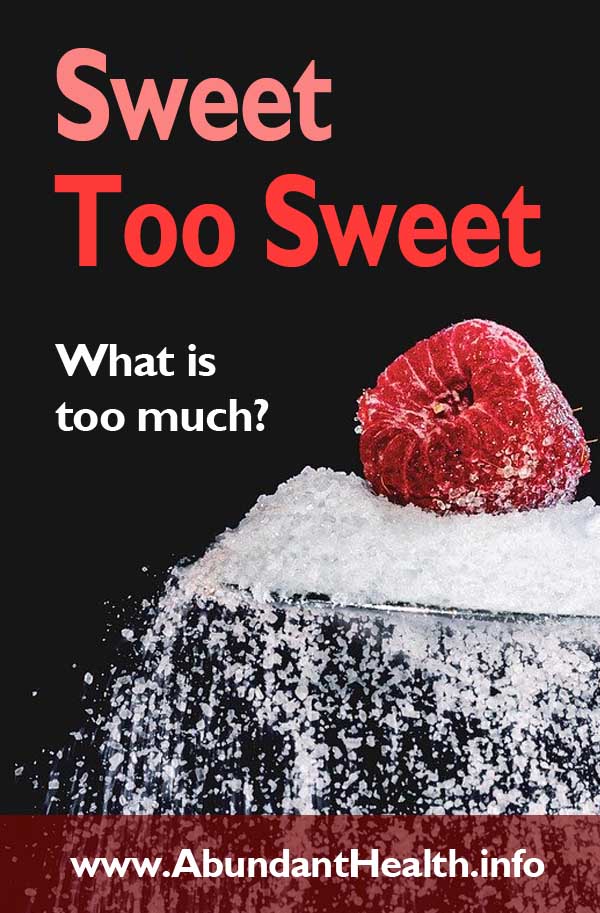We were created with a liking for sweet, but not all sweet things are alike or have the same effects. Even natural sweets vary in their properties. Here are some facts about “sweets” you may wish to consider as you make progress in the health journey you have started.

Fruits
The natural or “intrinsic” sugar found in fruit has two great advantages over “extrinsic” sugar added to foods, particularly if those foods are refined: it is better tolerated by diabetics, and it is less fattening. In addition to that, fiber, found in fruit, slows the absorption of sugars; thus less insulin is required. The less insulin is secreted, the less fat is produced (since one of insulin’s effects is promotion of lipogenesis, synthesis of lipids or fats in the body).
The Sweet Herb
Stevia (stevia rebaudiana) is used as a no-calorie sweetener. The ground herb is usually refined to a white powder, with its sweetness concentrated. Depending on how it is processed, it can have a bitter aftertaste.
Benefits of stevia:
- Provides a sweet taste with no calories
- Does not cause dental caries
- Effective in blood pressure reduction (it acts as a vasodilator)
- Improves glucose tolerance, being beneficial for diabetics

Natural Syrups
When used in moderation, such sweeteners as molasses, honey, and maple syrup are a good option for diabetic persons. Molasses contains less sugar, provides vitamin B6, and is very rich in minerals, particularly iron, calcium, and magnesium. Honey contains enzymes and properties endowed with medicinal properties. Maple syrup provides no vitamins, but it contains certain amount of minerals (calcium, magnesium, iron, potassium, and particularly zinc).

Chemical Sweeteners
The use of these substances is growing, due to the increasing interest in the developing world in lowering caloric intake. Saccharine, cyclamates, aspartame, and acesulfame K are the most commonly-used chemical sweeteners by the food industry as well as by individuals. They are also the most criticized.
Drawbacks to Chemical Sweeteners:
- They provide no nutrients.
- They pose health risks. All synthetic intense sweeteners present some risk of undesirable effects, from nervous disturbances to carcinogenic effects. There is an ADI (Acceptable Daily Intake) for each that should not be exceeded.
- Paradoxical effect. Contrary to what would be expected of these sweeteners, they could produce an increase in appetite, with its accompanying weight gain.
Bitter Side of Sugar

A century ago, sugar was used as a seasoning. Today it is used as a staple food. Most families buy more sugar than rice. The abuse of sugar has caused a number of detrimental side effects for our health:
- Calcium loss. Sugar metabolism requires B-complex vitamins (particularly B1) and minerals (calcium in particular). When sugar (which contains no vitamins or minerals) or refined foods are consumed, the body is forced to use its own reserves, thus risking deficiencies.
- Dental caries. All simple sugars promote tooth decay.
- Triglycerides. Sugar consumption increases the level of these fatty substances in the blood, which, in turn, promotes arteriosclerosis and heart disease.
- Obesity. Sugar and sugary foods are major causes of obesity in children and adults.
- Hyperactivity. There is a relationship between sugar consumption and certain behavioral disorders such as hyperactivity or attention deficit (ADHD).
- Gallstones.
- Crohn’s Disease. The combination of a great deal of sugar and little fiber is one of the causative factors of this disease.
- Gastroduodenal Ulcer. The use of sugar, together with a diet of refined foods low in fiber, increases the risk.
- Diabetes. There are no studies that prove that the liberal use of sugar is a cause of diabetes, but evidently it does make it worse and more serious.
- Bone Brittleness. A high-fat, high-sugar diet depletes calcium reserves in the body. This causes the bones to become brittle and fracture.
- Stomach Cancer. Sugar, saturated fat, and calcium increase the risk of stomach cancer.
- Colon Cancer.
- Retarded Fetal Growth. Pregnant adolescents who consume excess sugar have the probability of giving birth to low-weight babies.
Conclusion
There are differences between white sugar and more natural sweeteners. But all concentrated sweeteners need to be used with moderation. We need to get used to the natural taste of fruits. Anything that will taste sweeter than that will cause some harm, no matter what source they come from. Moderation is the key. And it is time to adjust our tastebuds to the natural tastes that God has created for us.
This article was published originally in the Journal of Health and Healing, a publication of Wildwood Institute.

Jorge Pamplona Roger, MD, MPH, currently serves as a professor of nutrition at River Plate Adventist University in Argentina. He has authored a number of books on nutrition, including the Encyclopedia of Foods and their Healing Power.
Lee is currently working as a physiology and health educator at Wildwood Health Institute and gives lectures across America on various health-related topics.
What about monk fruit sweetener?
What I know Monk fruit sweetener is a non-calory sweetener similar o stevia and can be used in similar ways. They have no calories and a good natural options. Just consider that all non-calory sweeteners can stimulate appetite and are not the best solution for weight loss. You could consider to mix it with another sweetener and use in moderation to minimize this effect.